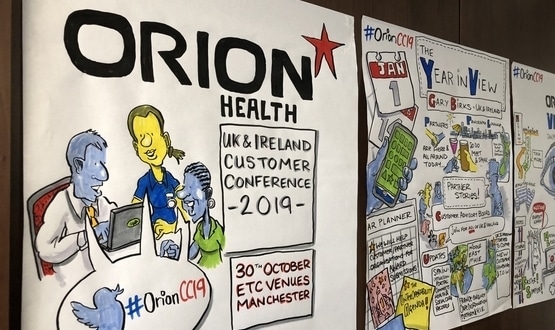Orion Health ‘back in growth mode’ as share buyback puts cash in bank
- 4 November 2019

Orion Health is “back to growth” just over a year after it sold off its integration business to a British investment firm amid falling profits.
Speaking at the company’s annual UK&I customer conference, CEO and founder Ian McCrae said Orion had “reinvented” itself in the year following its sale of Rhapsody to Hg.
Since delisting itself from the Australian and New Zealand stock exchanges in March, the company has turned its focus to creating “a number of small, innovative lines of business”, with a subsequent share buy-back pulling in approximately NZD $55million in cash and bank.
As a result, the company is “close to returning to profitability”, McCrae said.
“We haven’t been more well-capitalised for a long, long time,” he told Digital Health News.
“We’ve reinvented the company over the past 18 months. We took it back to what worked for us historically, which was an agile start-up model.
“What I find, when we get a development team of 30, 40 people, it becomes unwieldy and innovation slows up. You end up with a whole lot of inefficiencies that come with size.
“The Orion today versus the Orion two years ago is a totally different company.”
Representatives of Orion and its customers were at the conference to provide insights on ongoing programmes of work and ambitions for the future, covering off machine learning, medicines management and population health.
Kevin Ross, research director for Orion Health, discussed the company’s efforts around “democratising” machine learning with simplistic APIs and “drag and drop” functionality.
“A lot of our customers have great data but the idea of using machine learning is a bit scary,” said Ross, who also provided insight on new Orion products targeting data extraction, document tagging and data de-identification.
“We’re trying to make it so you don’t need a highly-capable data scientists involved in the process.”
Doubling down on machine learning
McCrae singled out Orion Health’s Engage platform as providing “really good ROIs”.
Engage is a web-based patient portal that leverages Orion’s Amadeus machine learning and data aggregation capabilities.
Having dedicated much time to promoting its then-new Amadeus business at its 2018 customer conference, Orion is now beginning to see its machine learning solutions making its way into its products.
McCrae said the company was “putting a lot of money into machine learning,” but acknowledged that applying it meaningfully into clinical workflows was “tricky”.
He explained: “We had a lot of problems finding right projects to do machine learning on.
“The problem needs to be doing something humans can’t solve and saving them money [and] be something people will eventually pay for.
Despite this, machine learning is where Orion sees the big value – and potentially big money – in the immediate future.
McCrae told Digital Health News: “We have a big wave of this stuff coming – more so than anybody else that I know of.”
“There’s a lot of talk around machine learning but very little of it is getting into production
“The stuff we’re looking at, around trying to standardise scripts, trying to predict surgical risks, length of stay, cost…in the next 12 months they will all get into our products.”
Gary Birks, Orion’s general manager of UK and Ireland, also offered an update on its signing with the Hampshire and Isle of Wight Care and Health and Information Exchange (CHIE).
Announced in August, Orion Health will be responsible for replacing CHIE’s underlying software, currently supplied by Graphnet.
Birks said: “We now have a six-month delivery window to replace the technology in the Hampshire record, by the end of March 2020.”




